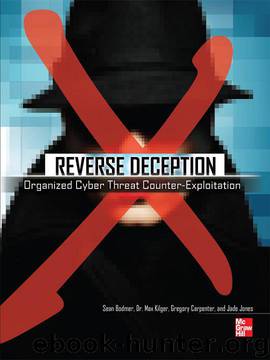Reverse Deception: Organized Cyber Threat Counter-Exploitation by Sean Bodmer & Dr. Max Kilger & Gregory Carpenter & Jade Jones

Author:Sean Bodmer & Dr. Max Kilger & Gregory Carpenter & Jade Jones [Bodmer, Sean & Kilger, Max & Carpenter, Gregory & Jones, Jade]
Language: eng
Format: epub
Tags: General, Security, Computers
ISBN: 9780071772495
Publisher: McGraw Hill Professional
Published: 2012-07-02T14:00:00+00:00
The ideas, conclusions, and opinions expressed in this chapter are those of the author. They do not reflect the official position of the US government or the Department of Defense. You also need to be aware that the tales that are included in this chapter are true stories that have been rewritten to protect the names of the innocent and guilty (even though we know who both of you are).
Deception Is Essential
The computer security business in both the public and private sectors is led by an important and influential group of people who know so little about so much. Vendors and governments worldwide parade such terms as governance, enterprise solutions, and compliance, pushing products, solutions, and regulations to try to protect us from all manner of viruses, spyware, hackers, and APTs. We are courted and married off into long-term commitments with antivirus and spyware companies promising the best protection against every kind of known and unknown threat you could find on the Internet today and tomorrow. The problem is that all these computer network defense tools are lagging and responsive defense products, meaning that they operate on what has already occurred. Something must have occurred in order for the company to build a signature or identify an IP address and label it as “bad,” or the detection engine must have enough anomalous information for the heuristics to compute a solution.
Companies do not have premonitions regarding the next exploit that is going to wreak havoc on the multitude of devices connected to the digital world compassionately called the Internet. There is no soothsayer on staff at McAfee or Kaspersky Lab, and no fortune-tellers at Symantec to warn the industry about the next logic bomb or zero-day attack. The truth is that reactive defense can offer only so much protection. Is it important? The answer is unequivocally yes. Does any antivirus company guarantee that you will not get infected? Does any company promise that if you use its product, you will not get hacked? Is there a money-back guarantee if a virus destroys your computer, router, network, product line, or corporation? What guarantees are given at all, and what good would a guarantee be if you got one from these folks anyway?
More often than not, the computer defense and IT security industry offer a “feel good” product line of solutions. Most nations around the world spend billions of dollars on security each year, only to be repeatedly hacked and exploited. Private corporations who offer solutions and are industry leaders in computer security are not exempt either. HBGary suffered a big loss when the company’s system was hacked and had thousands of internal proprietary e-mail messages posted on the Internet. In 2009, both Kaspersky and Symantec had their secure sites penetrated by a SQL injection attack. These are some of the international leaders in computer security succumbing to fairly rudimentary attacks. How secure are they? How secure can they make you? Who really knows?
In September 2007, the US Department of Homeland Security (DHS) made headlines when hackers compromised its unclassified systems.
Download
This site does not store any files on its server. We only index and link to content provided by other sites. Please contact the content providers to delete copyright contents if any and email us, we'll remove relevant links or contents immediately.
Kotlin in Action by Dmitry Jemerov(19348)
Grails in Action by Glen Smith Peter Ledbrook(16801)
Sass and Compass in Action by Wynn Netherland Nathan Weizenbaum Chris Eppstein Brandon Mathis(14284)
Configuring Windows Server Hybrid Advanced Services Exam Ref AZ-801 by Chris Gill(7520)
Azure Containers Explained by Wesley Haakman & Richard Hooper(7514)
Running Windows Containers on AWS by Marcio Morales(7066)
Microsoft 365 Identity and Services Exam Guide MS-100 by Aaron Guilmette(5451)
Microsoft Cybersecurity Architect Exam Ref SC-100 by Dwayne Natwick(5291)
Combating Crime on the Dark Web by Nearchos Nearchou(5044)
The Ruby Workshop by Akshat Paul Peter Philips Dániel Szabó and Cheyne Wallace(4720)
Management Strategies for the Cloud Revolution: How Cloud Computing Is Transforming Business and Why You Can't Afford to Be Left Behind by Charles Babcock(4563)
Python for Security and Networking - Third Edition by José Manuel Ortega(4296)
The Age of Surveillance Capitalism by Shoshana Zuboff(4274)
Learn Windows PowerShell in a Month of Lunches by Don Jones(4192)
Learn Wireshark by Lisa Bock(4192)
Ember.js in Action by Joachim Haagen Skeie(4074)
The Ultimate Docker Container Book by Schenker Gabriel N.;(3938)
DevSecOps in Practice with VMware Tanzu by Parth Pandit & Robert Hardt(3627)
Windows Ransomware Detection and Protection by Marius Sandbu(3599)
